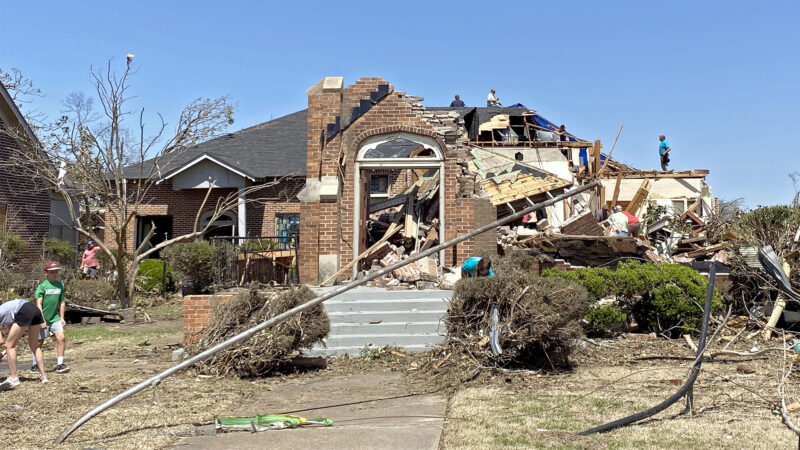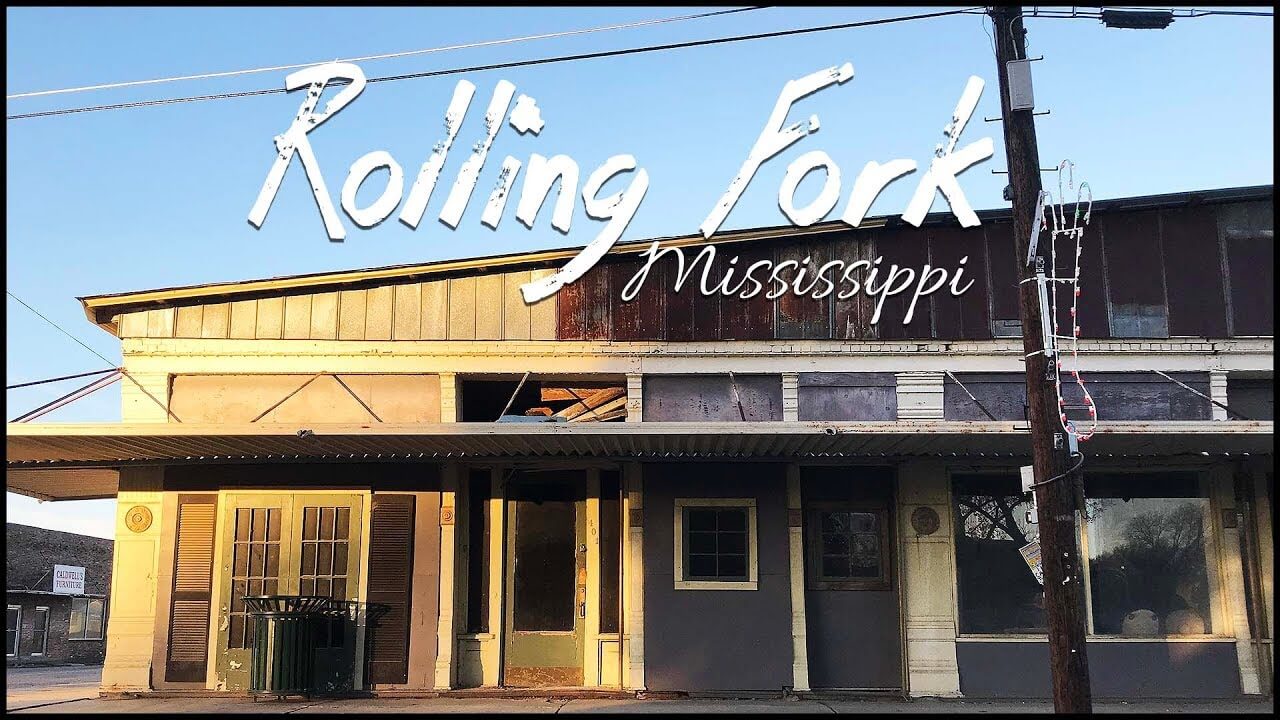On March 24, 2020, a deadly EF-4 tornado touched down in Rolling Fork MS, causing catastrophic damage across the town. According to the National Weather Service in Jackson, the tornado had sustained winds of up to 170 mph. The city of Rolling Fork, known for its annual “Great Delta Bear Affair,” was left in ruins as homes, businesses, and even the post office were destroyed. ABC News reported that the tornado victims were devastated by the loss and were left to retrieve what they could from the debris. Many buildings, including the historic Hotel Roosevelt’s roof, were left debarked by the powerful storm. The Mississippi Free Press archived from the original Wikipedia that FEMA and other relief agencies worked to help the town build back after the disaster.
Walker said “Rolling Fork MS” is one of the town’s water towers. The tornado also caused damage to neighboring towns like Silver City. WLBT and Iowa Environmental Meso net reported that the tornado crossed Mississippi from west to east, leaving a trail of destruction in its path. Residents of Rolling Fork are coming together to support each other in this difficult time, showing resilience in the face of tragedy. As the town begins the long process of recovery and rebuilding, the community is grateful for the outpouring of support from all across the state.
Overview of the Tornado
The EF4 tornado that tore through the Mississippi Delta region on March 25, 2023, brought widespread destruction to Sharkey County and Rolling Fork MS. The tornado hit the area with ferocious winds and extreme force, leaving a path of devastation. The storm’s severity caught many residents by surprise as the city grappled with the aftermath of this natural disaster.

Impact of the Tornado in Mississippi
The tornado’s impact in Mississippi was profound, affecting Rolling Fork MS and neighboring countries such as Issaquena. Sharkey County and Issaquena County bore the brunt of the storm’s fury, with towns like Vicksburg also experiencing severe weather conditions. The tornado emergency prompted swift responses from authorities, including the Mississippi Emergency Management Agency, as they worked to assess the damage and assist those in need.
Extent of the Devastation in Downtown Rolling Fork MS
Downtown Rolling Fork bore the brunt of the tornado’s wrath, with extensive damage to buildings, homes, and infrastructure. The city’s iconic landmarks, including the town’s water towers and City Hall, were not spared from the destruction. The tornado’s impact on mobile homes and residential areas was particularly severe, leaving many displaced residents needing immediate assistance. The debris scattered across the city served as a sad reminder of the power of nature and the community’s resilience in the face of adversity.
Rolling Fork: Before the Tornado
Rolling Fork MS, a small city in Sharkey County, is nestled in the heart of the Delta region. This vibrant community is known for its rich history and strong sense of community. Rolling Fork is home to picturesque landscapes, including lush wildlife and expansive green spaces, making it a haven for nature enthusiasts.
Description of Rolling Fork MS
Rolling Fork MS has a population that takes pride in its deep-rooted history and cultural heritage. The city’s unique blend of traditions and modernity creates a charming atmosphere that draws visitors and locals alike. The town’s main street is lined with quaint shops and historic buildings that tell the story of Rolling Fork’s past.
Historical Significance of Rolling Fork MS
Rolling Fork holds a special place in Mississippi’s history, being a key player in the state’s rich cultural tapestry. Rolling Fork’s historical significance is undeniable, from being a hub for agricultural activity to its role in the Civil Rights Movement. The town’s resilience in the face of challenges has shaped its identity and garnered admiration from residents and visitors alike.
Community Resilience in Rolling Fork
Despite facing various adversities over the years, Rolling Fork residents have displayed remarkable resilience and unity. The strong sense of community in Rolling Fork MS is evident in times of need, with neighbors coming together to support each other through thick and thin. This unwavering spirit has helped the town weather many storms in the past and will undoubtedly guide its recovery from the recent tornado disaster.
The Tornado’s Path and Intensity
On March 27, a deadly tornado with winds reaching 195 mph ripped across Mississippi, leaving a path of destruction in its wake. The town of Rolling Fork MS in Sharkey and Issaquena counties sustained significant damage, with many houses and the elementary school being destroyed. According to the governor and MEMA, a total of 17 people were killed, and over 165 were injured. The tornado moved northeast, causing power lines to be knocked down and homes to be left in ruin. Mayor Walker said it was the worst tornado to hit the town since the bear hunt on September
Route of the Tornado in Rolling Fork and Mississippi
Rolling Fork, Mississippi’s tornado followed a destructive path through Sharkey County and neighboring areas. The robust EF4 tornado hit the city of Rolling Fork MS with devastating force, causing widespread destruction along its route. Communities in Issaquena County and Vicksburg also felt the impact of the tornado’s wrath, leaving a trail of debris and uprooted structures in its wake.
Magnitude and Scale of the Tornado’s Destruction
The magnitude of the tornado’s destruction in Rolling Fork was immense. Buildings in downtown Rolling Fork were severely damaged, with homes, businesses, and infrastructure bearing the brunt of the storm’s intensity. The tornado’s scale of destruction extended beyond physical structures, impacting the lives and livelihoods of residents in the region. The aftermath of the tornado painted a grim picture of the extent of damage caused by the natural disaster.
Comparisons with Previous Tornadoes in the Area
The 2023 tornado in Rolling Fork, Mississippi, drew comparisons to historical tornado events in the area. The EF4 tornado’s ferocity and impact were reminiscent of past tornadoes that had struck the region. The community reflected on previous tornado experiences to assess the resilience and recovery efforts needed to rebuild after the recent disaster. Learning from past experiences was crucial in navigating the challenges posed by the destructive force of nature.
Aftermath and Recovery Efforts
Several people in the South Delta region of Mississippi were left devastated after a supercell tornado tore through their communities. The storm caused sustained damage to homes and businesses, leaving many without a place to live. Heather McDuffie of Rolling Fork described how her home was destroyed in minutes, leaving her and her family with nothing. Governor Harrison has promised aid to those affected, and recovery efforts are already underway, with teams aerially assessing the damage and providing support to those in need. The town is coming together to rebuild and restore what was lost.
Immediate Response to the Tornado in Rolling Fork
Following the tornado’s strike in Rolling Fork MS, immediate response efforts were mobilized to address the urgent needs of affected residents. Emergency response teams, including the Mississippi Emergency Management Agency, rushed to the scene to assess the damage and assist those impacted by the disaster. The coordinated response aimed to ensure the safety and well-being of residents amidst the chaos and devastation left behind by the tornado.

Assessment of Damage and Losses
Assessing damage and losses caused by the tornado was a critical step in understanding the extent of the devastation in Rolling Fork. Evaluating the impact on residential areas, businesses, and public infrastructure helped authorities quantify the losses incurred by the community. The assessment process also informed recovery efforts, allocating resources and support to areas needing assistance to expedite rebuilding.
Community Support and Rebuilding Initiatives
In the aftermath of the tornado, community support played a pivotal role in the rebuilding and recovery process in Rolling Fork MS. Residents, organizations, and volunteers rallied together to support and assist those affected by the disaster. Rebuilding initiatives were launched to restore the city’s infrastructure and homes, fostering a sense of unity and resilience among Rolling Fork residents as they worked towards reclaiming their community from the devastation caused by the tornado.

